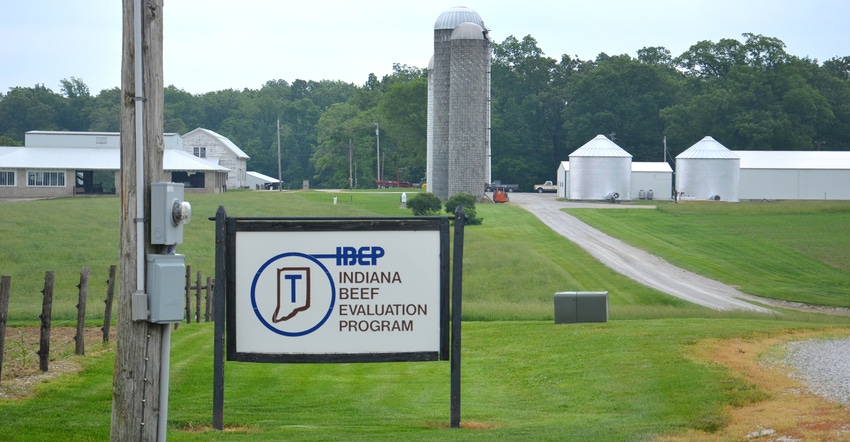
If you’re already planning your bull needs for the 2022 breeding season, keep the Indiana Beef Evaluation Program summer bull test program in mind. The highest-performing bulls coming off that test will sell at auction on Oct. 16.
Nick Minton, beef systems specialist with Purdue University and secretary-treasurer of IBEP, manages the IBEP bull test station located at the Feldun-Purdue Ag Center near Bedford, Ind. He notes that the station received 46 bulls on April 27, with the actual test beginning May 18 and concluding Sept. 20. While the winter test is much larger, bulls on the summer test undergo the same strenuous evaluation as bulls on the winter test, Minton says.
The summer test is for bulls born between April 1, 2020, and Sept. 30, 2020. “Most Indiana beef herds calve in the spring, so there are more bulls available for the winter test,” he explains. “Interest seems to be picking up somewhat in fall calving. But it is much more common in southern Illinois and southern Missouri.”
That’s why half the bulls in the summer test are from out of state, Minton notes. Typically, about one-third of bulls on the winter test come from out-of-state herds.
“One advantage for cattlemen who buy bulls in the fall sale is that they have about six months to take them home and get them adjusted to their farm before the spring 2022 breeding season,” Minton says. “That’s appealing to some buyers.”
Why buy IBEP bulls?
Minton says one reason IBEP sales remain popular is because bulls coming off an IBEP test have been through one of the most critical evaluation programs anywhere. Information is provided on both the bull’s sire and dam.
The bull’s mother must be confirmed negative for Johne’s disease, and the bulls themselves must test negative for bovine viral diarrhea, tuberculosis and brucellosis. Each bull must pass an intensive breeding soundness exam, and they are also issued feet scores, which are published for potential buyers to see.
“You don’t get that complete of a package everywhere,” Minton says. “We added scoring them for foot soundness because more people are emphasizing the need for good foot structure, so bulls hold up longer.
“The buyer can see our score and evaluate feet for himself. He or she may not agree with us, but it prompts him or her to pay attention to feet and legs when evaluating bulls.”
Bulls coming out of the winter test are usually put in service much quicker, Minton notes. The one thing buyers should remember is that bulls on lush pasture will still need supplementation with dry roughage and/or grain, Minton says.
“The same would apply for cows turned out on lush grass,” he adds. “That forage can contain so much moisture content that the animal can’t take in enough dry matter before it fills up. If they aren’t supplemented properly, they may shrink up some during the summer.”
For more information about the summer bull test, call Minton at 812-279-4330. You can also visit the IBEP website.
About the Author(s)
You May Also Like




